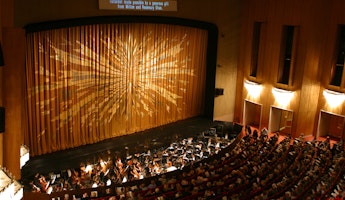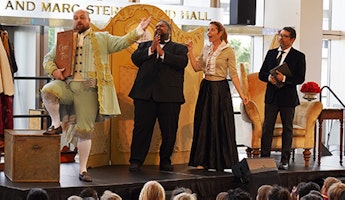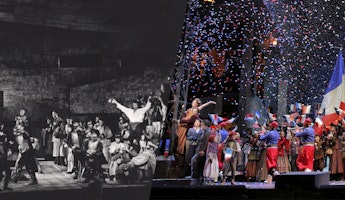Blog
July 23, 2024
Olympic Origins of LA Opera
The time for the 2024 Summer Olympics has arrived, with the event officially starting this weekend. Taking place in Paris this year, the Olympics will no doubt draw an audience of billions watching via television or streaming, as well as bring millions of sports fans to Paris to attend in person. With such a huge influx of people coming for the event, it’s a perfect opportunity for Paris to show off their culture. Los Angeles certainly did so when the Olympics were held here in 1984. For those who didn’t know, the 1984 Olympics has a very special significance for LA Opera, as it brought upon the birth of the company. But before we get into that, let us set the scene.
On June 1, 1984, over a month before the Olympics began, Los Angeles saw the opening of the Olympics Arts Festival. This festival featured more than 400 performances by 145 theater, dance and music companies. On top of this, it encompassed a wide variety of world culture, with every continent represented. On the opera front, the most notable company to come was London’s Royal Opera, which brought three touring productions: Turandot, Peter Grimes and The Magic Flute. Their enormous success would bring community leaders together intent on giving Los Angeles its very own major opera company.
After consulting with leaders in the opera industry, LA Opera’s founders hired Peter Hemmings to create the new company. Mr. Hemmings was one of the world’s most respected opera administrators and he immediately put his vast experience to work after arriving here in October of 1984. The first opera he brought to LA was an Opera Theatre of Saint Louis production of The Beggar’s Opera, presented at the Embassy Theater in 1985. In that same year, he also brought three operas to the Dorothy Chandler Pavilion: The Marriage of Figaro, Tosca and Die tote Stadt, touring productions from Deutsche Oper Berlin.
Their success laid the groundwork for LA Opera’s inaugural season, which launched on October 7, 1986. The first opera presented was Otello, and the following two nights had Madama Butterfly and Salome taking the stage. Salome in particular created a sensation, and the production would go on to tour the world.
It didn’t take long for LA Opera to become the fourth largest opera company in the United States and a major player in the international opera world. Four decades later, our company is still going strong and bringing world class opera to Los Angeles at affordable prices. It's remarkable to think that this all was inspired by the Olympics coming to town. This just goes to show the cultural impact that the Olympic Games can have, not just on sports, but in the cities that host them as well. Thanks to the Olympics, Los Angeles went from being the only major city in the United States without a resident opera company to the home of a vibrant, international opera capital.








/03-cosi/_dsc0996_pr.jpg?format=auto&fit=crop&w=345&h=200&auto=format)















